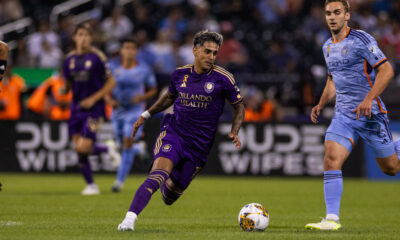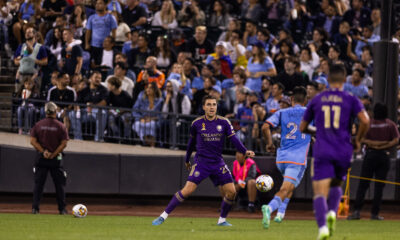Orlando City
Intelligence Report: Orlando City vs. Portland Timbers
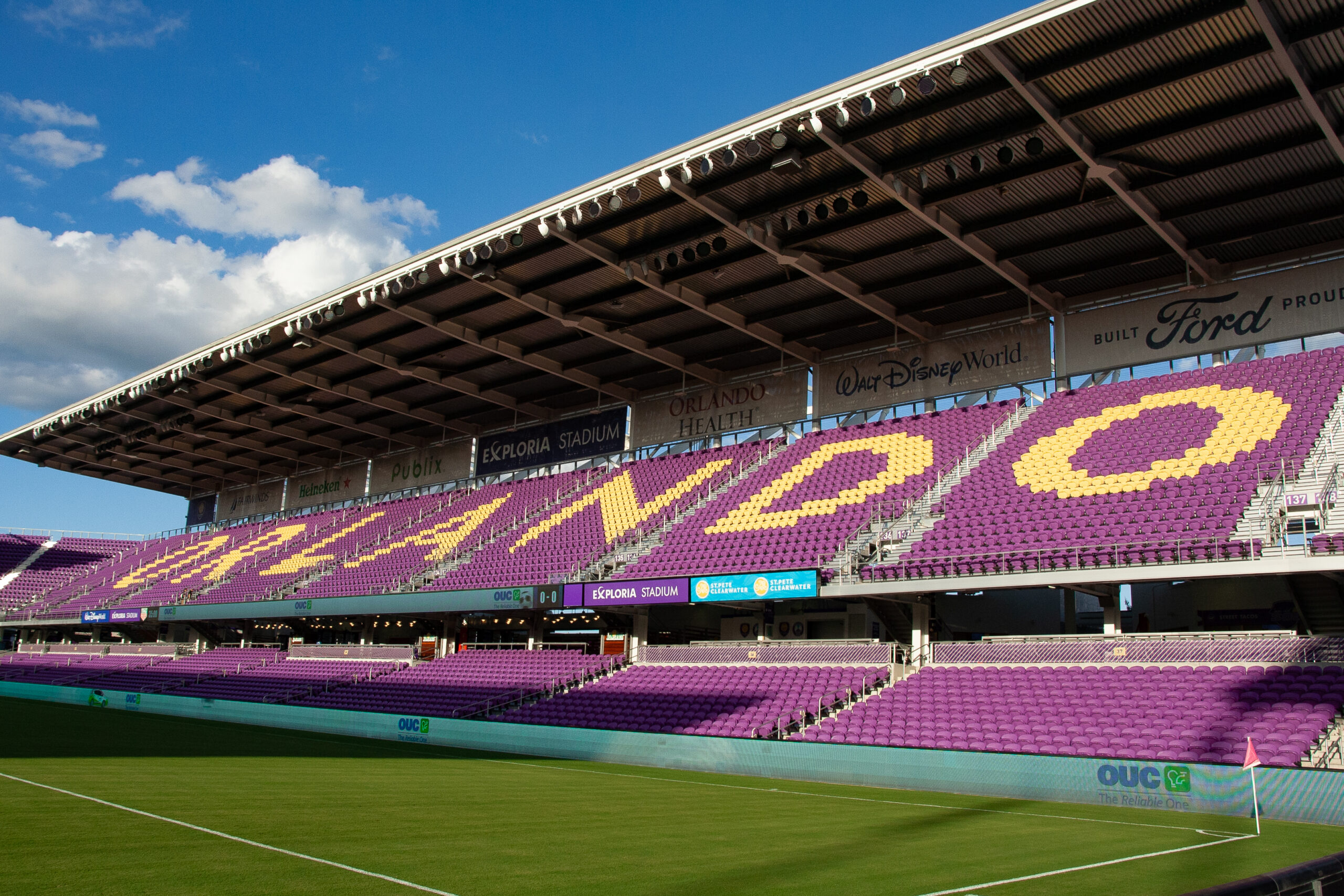
The Portland Timbers are trending upward, taking two points from their last two after being battered in their opening matches of 2018. But they travel across the continent to Central Florida to take on an Orlando City team that is also on the upswing after a wild 4-3 victory over the New York Red Bulls.
There’s a new boss at the helm in the Rose City and, while the bulk of the roster has remained intact, the team that topped last year’s Western Conference has struggled to get results this time around.
For what to expect of this year’s Timbers, we’ve asked Will Conwell from Portland’s SB Nation blog Stumptown Footy to give us some insight. I also answered some questions about our side and you can find them over at their place.
How has life been after Caleb Porter and how has Giovanni Savarese left his mark on this team?
Will Conwell: Saravese has certainly had an impact on the Timbers through four games this season, changing up the side’s tactical approach after five years of playing under Porter. In those four games there have been definite struggles as the team looks to adjust to their new look, but as the team has adapted to Saravese and Saravese has adapted to the team, the results have gone from disappointing to encouraging over the course of the Timbers’ season-opening road trip.
Under Porter, the Timbers developed an identity as a team that was capable of holding the ball and would wear down teams with their possession, as well as being a side capable of picking their moments and striking out on the break after dropping deep and welcoming their opposition forward.
In many ways, Saravese’s preferred approach to the game is the opposite of this. Given the right personnel, Saravese would love to be a team that actively presses high up the pitch, turning over the opposing team deep in their own end and creating the sort of high value chances that come when the defense is out of its shape. Unfortunately, while the Timbers’ attacking trio of Fanendo Adi, Diego Valeri, and Sebastian Blanco are all capable of being quite active on the defensive front, none seem particularly inclined toward the sort of high energy performance it takes to press all game.
That is not to say that the Timbers have abandoned the high press. In last weekend’s 2-2 road draw against the Chicago Fire, the Timbers were able to put the home side on the back foot for much of the match, getting the opening goal early in the match after turning over the Fire and taking advantage on the break. Saravese is still determining how best to make use of his players, but the seeds that he has planted with the side are showing definite signs of growth.
Portland’s defense struggled through March, allowing nine goals in four matches. Liam Ridgewell’s exclusion from the side has been a major talking point; are the two things related?
WC: Ridgewell was on the field for six of the Timbers’ nine goals allowed so far this season and as the team captain, his lack of effort in the side’s 4-0 week two loss to the New York Red Bulls was particularly galling.
In the first two matches that the Timbers — and Ridgewell — played, the side were disorganized and disheartened. The back line was out of sync, the midfield was disconnected, and the forwards were stranded on an island by themselves. Not all of that can be pinned on Ridgewell, but as a veteran and the team captain, it is on him to rally the side through words or deeds and it appeared that he went for neither.
What’s more, Ridgewell’s game has long been built around his ability to take a timely step up and break up a play with a headed ball away, an interception, or a timely foul. Without a dedicated defensive midfielder in front of him, dropping back onto the back line as David Guzman or Diego Chara did so often in 2017, Ridgewell has struggled to keep from opening up holes on the back line through his play. In the right situation and the right formation, Ridgewell’s instincts could still serve him well, but with the changes that Saravese has looked to implement this year he has often been the odd man out.
Recent word from the Timbers camp is that Ridgewell has taken the benching like a professional and is training well. Ridgewell is training so well, according to word from this week’s training sessions, he is in consideration for a return to the 18 this weekend. This is all, of course, exactly what the Timbers should be saying and after two weeks in exile, it seems as likely as not that the Timbers will continue to turn to Larrys Mabiala and Bill Tuiloma, the self-proclaimed “French Connection,” to be their starting center backs.
How has the team dealt with Darlington Nagbe’s high-priced departure over the off-season?
WC: The loss of Nagbe to Atlanta United, the Timbers’ first draft pick and a staple of the side since they joined Major League Soccer in 2011, has been difficult for the Timbers to deal with as they adjust to life without him.
Nagbe brings a number of things to the pitch, but first and foremost is an absolute inability to lose the ball. A pass anywhere near Nagbe at any speed is as good as received. Getting the ball on Nagbe’s foot means that he will get off a pass to another player on his team just about every time. Losing that remarkable knack for possession makes things difficult for the Timbers. Without Nagbe, the Timbers have lost one of their most effective pressure release valves. They no longer have a player that they can just pass the ball near and expect good things to happen.
At the same time, the loss of Nagbe has been freeing for the Timbers.
Nagbe’s unwillingness or inability to get involved in the attack in a regularly effective manner has long been a source of frustration for anyone who watches him play. Without Nabge on the pitch, the Timbers have looked to Sebastian Blanco to provide many of the same services in transition that Nagbe once did and they have profited from it. While Blanco is far from the possession machine that Nagbe was for the Timbers, his creativity, flair, and attacking mindset have already paid dividends this year with three goals and an assist through four games.
In Nagbe’s absence and with teams unable to ignore the dual attacking threats of Diego Valeri and Fanendo Adi, Blanco should continue to flourish this year.
What injuries/suspensions will keep players out this weekend and what is your projected lineup and predicted final score?
WC: (4-3-2-1) Jake Gleeson; Vytautas Andriuškevičius, Bill Tuiloma, Larrys Mabiala, Zarek Valentin; Christhian Paredes, Diego Chara, Andres Flores; Sebastian Blanco, Diego Valeri; Fanendo Adi
2-1 Orlando, with a Will Johnson goal and a Dom Dwyer red card.
Thanks again to Will for taking the time to provide some information on this weekend’s visitors.

Orlando City
Orlando City vs. CF Montreal, Leagues Cup: Preview, How to Watch, TV Info, Live Stream, Lineups, Match Thread, and More
The Lions begin their 2024 Leagues Cup quest at home against Montreal.
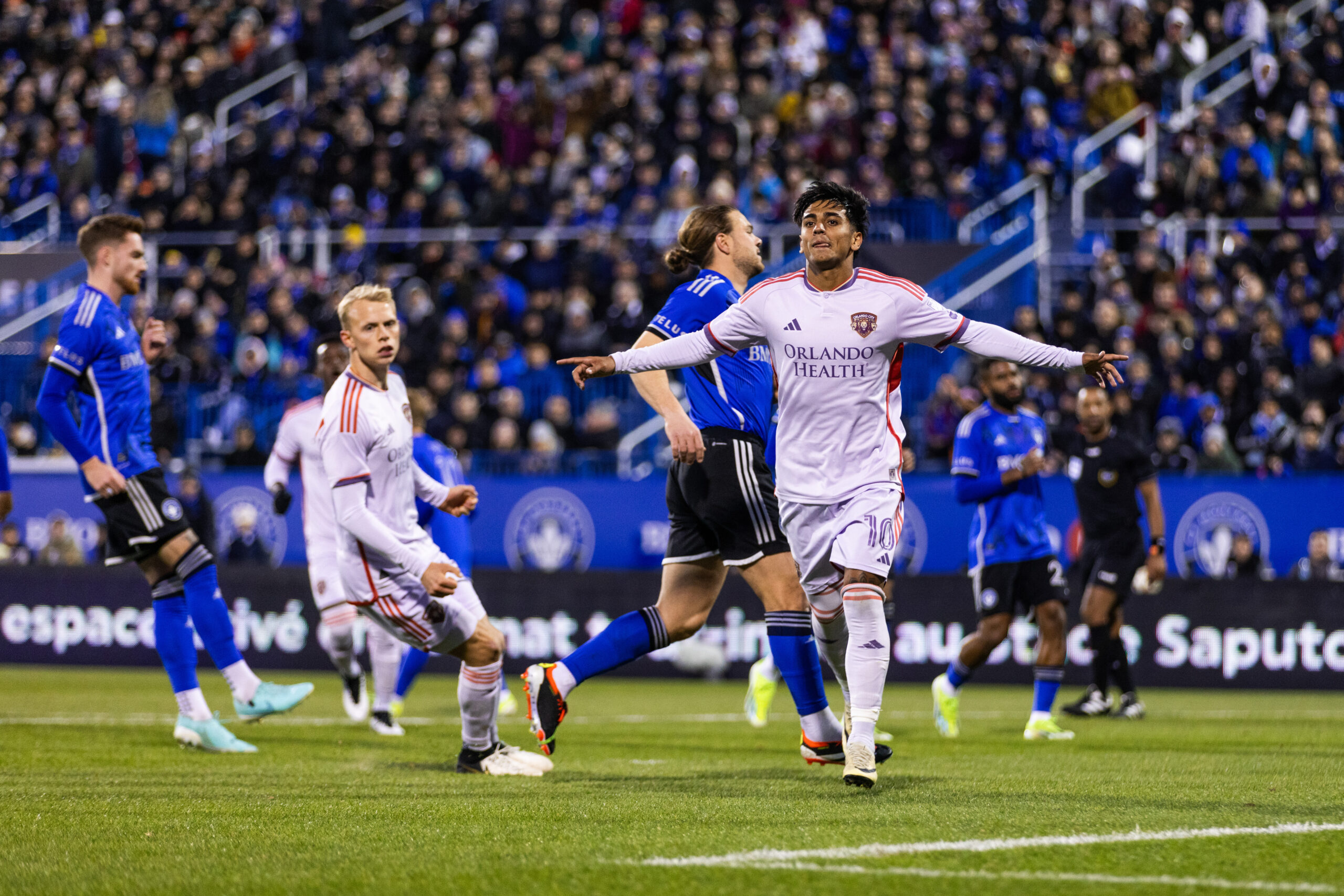
Welcome to your match thread for a Friday night Leagues Cup matchup between Orlando City and CF Montreal at Inter&Co Stadium (8 p.m., MLS Season Pass on Apple TV+). It’s the first match of the competition for both teams, and tonight’s game marks the third time the two Eastern Conference sides will meet this season. The teams split the points in both regular-season matchups, drawing both times. More on that later.
Here’s what you need to know ahead of the match.
History
The Lions are 8-9-5 against Montreal in the all-time regular-season series and 9-10-5 in all competitions since they joined MLS. OCSC is 4-4-3 in its home stadium against Montreal and 5-4-3 in the greater Orlando area when including a win in the knockout rounds of the MLS is Back Tournament in 2020.
The two sides last met in Montreal on April 20, trading goals back and forth in a 2-2 draw at Stade Saputo. Mason Toye opened the scoring early but Facundo Torres equalized from the spot a few minutes later. Ariel Lassiter appeared to win it late in normal time for the hosts, but Ivan Angulo struck in stoppage time to earn Orlando City a road point. These teams opened the 2024 season against each other in Orlando and played to a 0-0 draw. The Lions dominated the stat sheet but had a goal waved off for offside and simply weren’t lethal enough in front of goal.
The teams met twice in 2023, completing the season series on Sept. 30, 2023, with the Lions winning 3-0 in dominant fashion. Jonathan Sirois’ own goal opened the scoring, and Dagur Dan Thorhallsson and Torres added strikes for Orlando City. That was a good measure of revenge for OCSC, after Montreal defeated Orlando City 2-0 and handed the Lions their first road loss of the 2023 MLS season on May 6 at Stade Saputo. A Robin Jansson own goal got Montreal started in the second half and Romell Quioto added a second goal four minutes later.
These two sides played their biggest game against each other in the 2022 MLS playoffs, with CF Montreal knocking Orlando City out of the postseason by a 2-0 scoreline on Oct. 16, with goals by Ismael Kone and Djordje Mihailovic — the latter coming deep in stoppage time from the penalty spot.
Each team won at home in the two-game, regular-season series in 2022, with Montreal thumping Orlando 4-1 on May 7. Joel Waterman, Mihailovic, Joaquin Torres, and Zachary Brault-Guillard did the damage on the scoreboard and Orlando City managed just two shot attempts, with Joao Moutinho’s goal on a set piece helping the Lions avoid a shutout. Orlando City did not have either starting center back for that match, and it showed. The teams also met on opening day of the 2022 season, when Orlando City captured a 2-0 home win behind second-half goals from Alexandre Pato and Benji Michel.
In 2021, the teams met in Montreal on Decision Day, with the Lions earning a 2-0 road victory at Stade Saputo to clinch a playoff spot. Sebas Mendez and Daryl Dike provided the goals. That season’s matchup in Orlando came on Oct. 20, 2021, with the visitors managing a 1-1 draw. Chris Mueller struck for the Lions just before halftime, but Rudy Camacho answered on a corner kick header shortly after the restart. The first meeting of 2021 took place Sept. 15 in Orlando with the Lions falling 4-2 and finishing the game with just nine men after both Nani and Andres Perea were sent off. Quioto led Montreal with a goal and two assists. Mathieu Choiniere and Quioto put Montreal up 2-0, but despite already being down one man, Jansson and Ruan tied things up. The visitors got two more from Lassi Lappalainen and Sunusi Ibrahim.
The teams met at Red Bull Arena in late 2020 as the team then known as the Montreal Impact played home games in New Jersey due to the pandemic. Orlando City got a Dike goal in the 39th minute to win 1-0 on Nov. 1, 2020. It was the second meeting of the 2020 season, with Orlando also beating Montreal 1-0 in the MLS is Back Tournament knockout rounds on July 25 to advance to the quarterfinals. Tesho Akindele scored the game’s only goal on a Montreal defensive mistake.
Orlando City snapped a six-game winless streak against Montreal (0-5-1) in MLS regular-season play dating back to 2016 when the Lions put the Impact to the sword in a 3-0 drubbing at Stade Saputo on June 1, 2019. Nani (penalty), Akindele, and Will Johnson supplied the offense that day. The Lions fell 3-1 at Exploria Stadium back on March 16, 2019, and Ignacio Piatti was a big reason why, scoring his ninth and 10th career goals against Orlando, adding to a strike by Orji Okwonkwo. Dom Dwyer added a cosmetic goal late for Orlando City to spoil the clean sheet.
Montreal did not allow a goal against the Lions in 2018, sweeping the two-game set from Orlando, and the Impact shut out Orlando City in three of the six meetings in that 5-0-1 run. The lone draw in that time frame was a 3-3 shootout in Orlando in 2017, in which the Impact led deep in stoppage time, only to see Jonathan Spector’s well-placed header steal the Lions a point.
Orlando won the first two meetings in 2016 by a combined score of 6-2. The teams split three meetings in 2015, with each going 1-1-1.
Match Overview
Orlando City enters this match on a five-game unbeaten run (4-0-1). The Lions are coming off a tightly contested 1-1 home draw against New York City FC on Saturday. The only Orlando goal was provided by Ramiro Enrique, but the Lions conceded a Hannes Wolf strike five minutes later. Enrique is in fine form, having scored goals in each of his last four games. Regardless of Orlando’s form, this competition is not part of the MLS regular season, so it’s difficult to know how teams and players will approach it. In addition, it’s not like the Lions have lit it up at home in 2024, amassing a poor record of 3-5-4 at Inter&Co Stadium. However, the Lions have been better of late, going 2-0-1 in their last three at home.
Montreal sits four spots and seven points behind Orlando in the Eastern Conference standings at the Leagues Cup break, struggling to defend in 2024. CF Montreal has allowed 49 goals this season, which is just one fewer than D.C. United’s conference-worst 50. The Canadian club, which is coming off a 1-0 home loss to rival Toronto on Saturday, is 2-7-4 on the road this season and is 0-7-3 in its last 10 road games against MLS competition (0-7-4 on the road in all competitions in its last 11).
A new competition offers hope for both teams, especially Montreal. There is not as much pressure to get a result for the underdog visitors, and it’s a chance to reset and chase a trophy. Ibrahim and old nemesis Josef Martinez are offensive players the Lions must account for, as they are Montreal’s leaders with six and five goals, respectively. Former Lion Ruan will present enough speed to keep up with Orlando City’s Angulo, so that will be an interesting battle to keep an eye on tonight (assuming both play).
“First, we are very excited to participate in this tournament. Last year, I thought it was a successful one, and the experience we had playing the two leagues was good,” Orlando City Head Coach Oscar Pareja said ahead of the match. “We played against Houston [Dynamo] and Santos [Laguna], which is one of the best teams in Mexico, and the experience was good. Overall, we are preparing and respecting the tournament as much as we can. Everyone is excited to be a part of it.”
As of this writing, it doesn’t appear that availability reports will be a thing for the Leagues Cup, but it’s fair to say the Lions will be without Duncan McGuire (international duty), Mason Stajduhar (lower leg), and Michael Halliday (knee).
Match Content
- Our most recent episode of The Mane Land PawedCast features our key match-ups and score predictions for tonight’s game.
- Our David Rohe provided his three keys to an Orlando City victory over Montreal.
Official Lineups:
Orlando City (4-2-3-1)
Goalkeeper: Pedro Gallese.
Defenders: Kyle Smith, Robin Jansson, David Brekalo, Dagur Dan Thorhallsson.
Defensive Midfielders: Cesar Araujo, Wilder Cartagena.
Attacking Midfielders: Facundo Torres, Martin Ojeda, Nico Lodeiro.
Forward: Ramiro Enrique.
Bench: Javier Otero, Rafael Santos, Luca Petrasso, Alex Freeman, Rodrigo Schlegel, Felipe, Jeorgio Kocevski, Favian Loyola, Yutaro Tsukada, Luis Muriel, Jack Lynn.
CF Montreal (3-4-1-2)
Goalkeeper: Sebastian Breza.
Defenders: Fernando Alvarez, Joel Waterman, Gabriele Corbo.
Midfielders/Wingbacks: Joaquin Sosa, Nathan Saliba, Victor Wanyama, Ruan.
Attacking Midfielder: Mathieu Choiniere.
Forwards: Matias Coccaro, Sunusi Ibrahim.
Bench: Jonathan Sirois, Lassi Lappalainen, Dawid Bugaj, Bryce Duke, Ilias Iliadis, Ariel Lassiter, Joseph Martinez, Kwadwo Opoku, Tom Pearce, Rida Zouhir.
Referees:
REF: Adonai Escobedo González.
AR1: Enrique Bustos Díaz.
AR2: Enedina Caudillo Gómez.
4TH: Lizzet Garcia Olvera.
VAR: Melissa Borjas Pastrana.
How to Watch
Match Time: 8 p.m.
Venue: Inter&Co Stadium — Orlando.
TV/Live Stream: MLS Season Pass on Apple TV+.
Radio: FM 96.9 The Game (English).
Twitter: For rapid reaction and live updates, follow along at @TheManeLand, as well as Orlando City’s official Twitter feed (@OrlandoCitySC).
Enjoy the match. Go City!
Orlando City
Examining the Sustainability of Ramiro Enrique’s Scoring Explosion
Is Ramiro Enrique’s scoring outburst sustainable, or is a regression to the mean on the horizon?
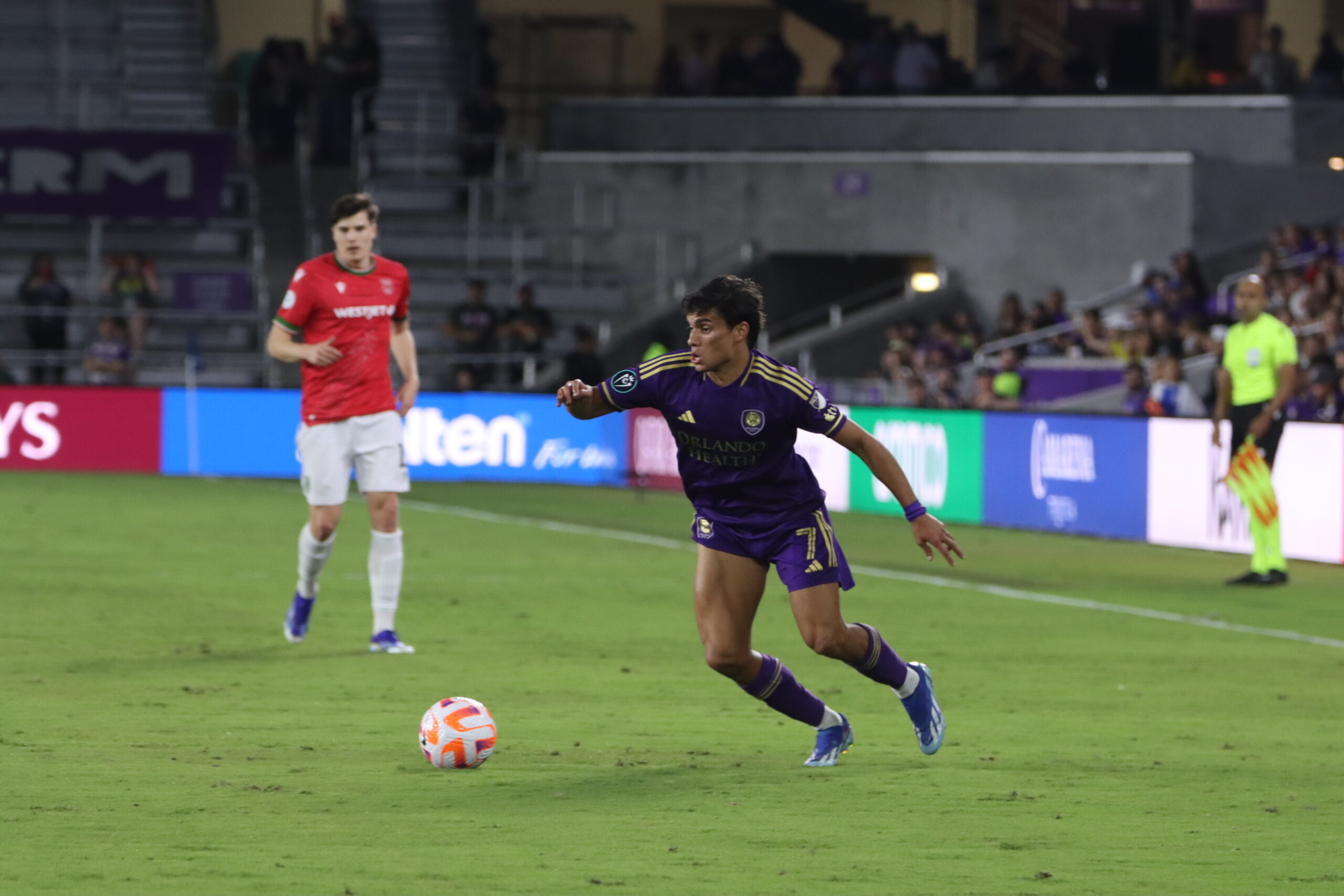
Since Orlando City’s 5-0 thumping of D.C. United back on July 6, Ramiro Enrique has tapped into a red-hot vein of form. He’s got four goals in four games, matching his scoring output from the entirety of the 2023 season, and doing so in four matches and 245 minutes, as compared to 30 matches and 1,019 minutes last year. That brings us to the big question: is this sort of output sustainable?
We’ll start by looking at the expected goals on each of his four tallies. While xG isn’t a perfect statistic, it provides a fairly good measure of how good a chance is. To get a clearer picture, we’ll also take a look at each goal to help gauge how difficult the chance is.
Against D.C. United, Enrique latched onto a flicked-on header from a corner kick and used a header of his own to score the Lions’ fifth and final goal of the night. That strike had an xG of 0.1. In truth, that number seems a bit low to me, as once Enrique’s in front of his defender, he has the whole net to aim at, and the ball comes in at a great height for him to get his head on it. He makes no mistake and sticks it into the side netting, where the goalkeeper has no hope of reaching it.
Against the New England Revolution, the Argentine again scored from a corner, sneaking in front of goalkeeper Aljaz Ivacic and flicking the ball past him before he could collect Cesar Araujo’s header. His second goal of the season had an xG of 0.4. That number seems more reasonable to me. Once he does the hard work of losing his marker and getting across Ivacic, the goalkeeper is helpless to stop any ball that isn’t coming straight at him, and it’s a good finish.
Against Nashville, he collected a pass from Ivan Angulo a few yards outside of the six-yard box and blasted it off the crossbar and in. The tight angle from which he scored means the xG of 0.04 isn’t too surprising. Once again, Enrique managed to lose his defender and got himself into a really nice area of open space. The finish is outstanding, but it wouldn’t have been surprising to see a save or shot off target from this angle.
His fourth goal of the year had elements of skill and luck, as he redirected Martin Ojeda’s shot against NYCFC. The effort from Ojeda took a deflection off Enrique that caught the goalkeeper leaning the wrong way and had enough pace to carry it into the net, for an xG of 0.11. Again, I’m surprised the number is as high as it is. That’s probably due to the deflection happening in the box and leaving Matt Freese next to no time to react. While it was a clever touch to redirect it, there was also a good deal of luck involved.
Those totals add up to 0.65. In other words, Enrique would be estimated to score 0.65 goals off those chances (or one, rounding up, as there are no fractions of goals), and he instead bagged four. There are a couple ways you can view that. The optimist would say that he’s simply a good finisher and has been making the most of the chances that have come his way, even when they aren’t very good ones. The pessimist would say that him converting low percentage chances at this rate isn’t sustainable, and he’s due to regress back to the mean soon.
We can also look at the bigger picture of his statistics up to this point in the year. Across 11 games and 483 minutes, Enrique has taken 18 shots, put nine of them on target, and scored from four of those. He’s also got a season xG of 3.52, which is pretty much in line with his goal total of four, although he’s slightly outperforming it. That isn’t a bad thing though, as the best strikers score difficult chances too, not just the easy ones. Cristian Arango, Christian Benteke, and Denis Bouanga are the top three scorers in the league, and Bouanga is the only one not outperforming his xG (17.68 xG compared to 16 goals).
In my opinion, the truth of Enrique’s case lies somewhere in between. He’s put 50% of his shots on target this year, which is a great number, and getting the ball on frame is half the battle in this sport, so that’s an encouraging place to start. Each of his first three goals in 2024 came as a result of getting into space in a dangerous area and making no mistake with his finish once the ball arrived. Against D.C., he did well to get in front of his defender. In New England, he snuck in from the blind side of the defense. And against Nashville, he found space in the box and stayed onside until Angulo was able to find him. That sort of movement and ability to get yourself into dangerous areas is something that can be replicated, even if finishing low-percentage chances like the strikes against Nashville and NYCFC probably isn’t.
If Enrique continues being clever with his movement and finding dangerous spaces, Orlando’s offense has begun to look fluid enough that his teammates will find ways to get him the ball. As long as he keeps getting shots on frame and his finishing stays sharp, it isn’t unreasonable to assume that he’ll grab some more goals this year. It probably won’t be at the rate he’s done so in July, but if nothing else, he should be able to provide some extra firepower to an OCSC attack that has woken up in recent weeks. Keep your fingers crossed, folks. Vamos Orlando!
Lion Links
Lion Links: 7/26/24
Orlando City plays CF Montreal tonight, USWNT wins against Zambia, Marta provides assist in Brazil’s win, and more.
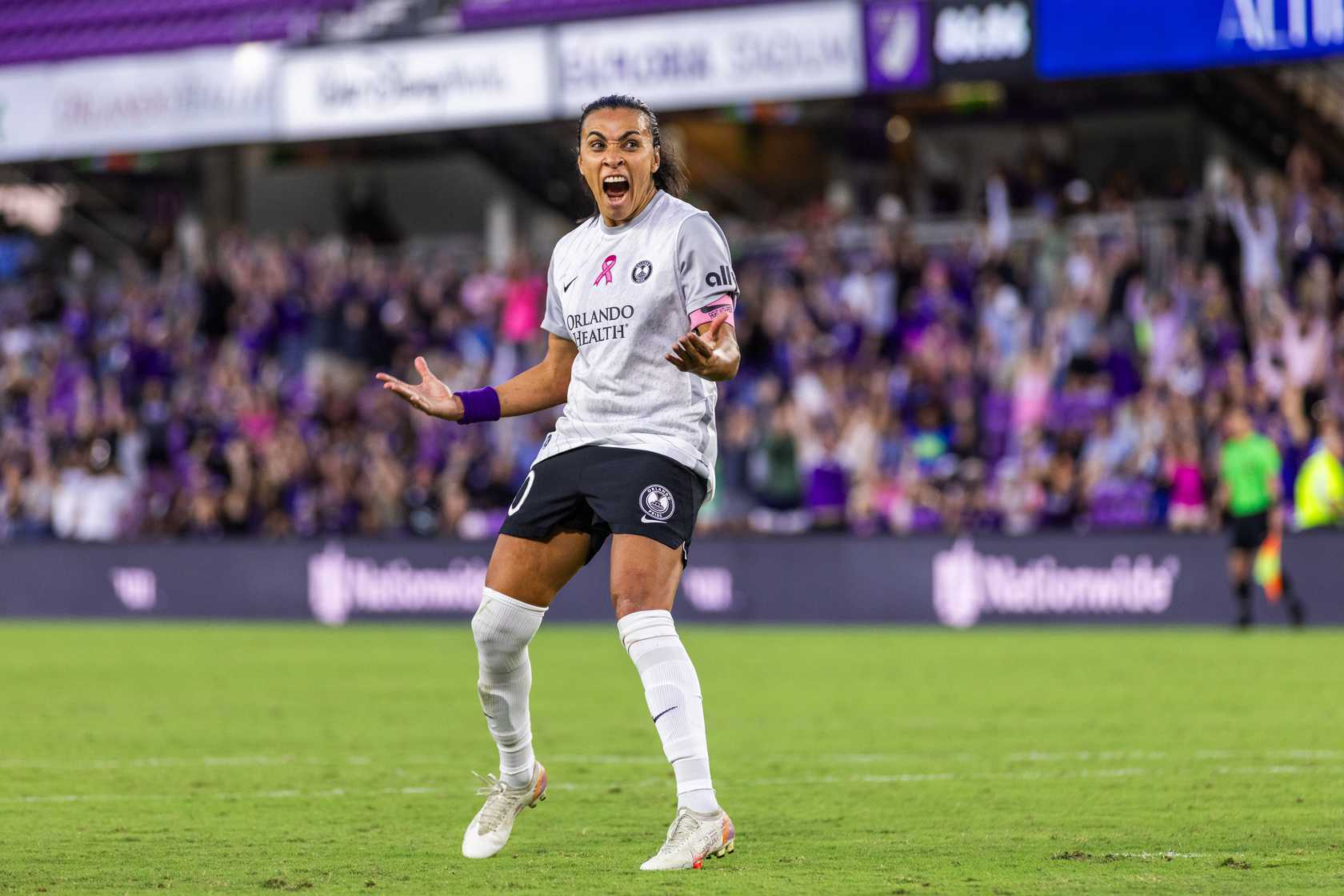
Happy Friday! I hope the work week has gone easy on you as we get ready for a weekend filled to the brim with soccer to enjoy. The Olympic opening ceremony is also today, and I’m interested to see what the organizers in Paris have come up with. But for now, let’s get this Friday started with today’s links!
Orlando City Takes On CF Montreal Tonight
The Leagues Cup kicks off today and Orlando City will host CF Montreal tonight in its first of two group games. The Lions will then take on Atletico de San Luis on Aug. 4. It’s worth noting that these games will go into a penalty shootout if the score remains level after 90 minutes, with the winner of the shootout getting an extra point. The top two teams of each group advance to the next round and Orlando will play the Philadelphia Union, Cruz Azul, or Charlotte FC if it survives the group stage.
USWNT Beats Zambia in Summer Olympic Opener
The United States Women’s National Team started its Olympic campaign with a dominant 3-0 win against Zambia. The USWNT’s attack looked free and dangerous, with Trinity Rodman striking first and Mallory Swanson scoring twice in quick succession to give the USWNT a comfortable lead. Those goals also came before Zambia was reduced to 10 players after a red card to Pauline Zulu. The Orlando Pride’s Barbra Banda and Grace Chanda both started for Zambia, although Chanda was subbed out in the first half when Zambia had to make changes due to the red card.
There is some bad news along with the good for the USWNT though. Jaedyn Shaw missed out on playing in the opener due to a leg injury, and Sophia Smith had to exit in the 42nd minute.
Marta Assists in Brazil’s Olympic Win
The USWNT was far from the only team to win its first game of this year’s Olympics, as there were no draws after the first round of games. Pride star Marta provided the assist on Brazil’s only goal in a 1-0 win over Nigeria. Marta did well to pick out Gabi Nunes from a tough angle, and the striker had a great first touch and strike to put it away. Pride defender Rafaelle helped secure the shutout, with Brazilian goalkeeper Lorena coming up with huge saves as well. Elsewhere in Group C, Spain’s Aitana Bonmati had a goal and an assist in her team’s 2-1 win against Japan.
New Zealand struck first against Canada in Group A, but the Canadians rallied to come back and win 2-1. France scored three goals in the first half and survived a rally from Colombia in the second half to win 3-2. Germany may have had the most impressive win so far, beating a talented Australian side 3-0.
Analyzing New Zealand Ahead of Olympic Clash
The United States Men’s Olympic Soccer Team will aim to bounce back from a loss to France when it faces New Zealand on Saturday. New Zealand beat Guinea in its first game and is coached by Darren Bazeley, who led New Zealand to the knockout stage of the 2023 U-20 World Cup. Minnesota United center back Michael Boxall and Viking FK midfielder Joe Bell are two of New Zealand’s overage players and give the team some stability. Goalkeeper Alex Paulsen, who joined Bournemouth this summer, is capable of coming up with acrobatic saves to give the U.S. fits as well. As for New Zealand’s attack, midfielder Sarpreet Singh and striker Ben Waine are a couple of the dynamic players the U.S. will have to keep in check.
Bev Priestman Removed From Canadian Olympic Team
Canada will have to go the rest of the Olympics without Head Coach Bev Priestman, who was removed from the team by the Canadian Olympic Committee. This decision comes amid a scandal involving spying on New Zealand’s training, which led to Canada Soccer suspending Priestman for the rest of the tournament. Reports have also surfaced that Canada’s men’s and women’s teams have tried to spy on opponents for years, including during the women’s team’s winning campaign in the 2021 Olympics. Only time will tell if Priestman will coach the team after this tournament and if punishments for the team’s actions will be handed out.
Free Kicks
- Orlando City’s Kaleb Harrington received the Spirit of Fair Play Award for his role in the Special Olympics Unified Sports All-Star Game. The East All-Stars were victorious as well, winning 5-0 against the West All-Stars.
- Chicago Red Stars defender Sam Staab was placed on the season-ending injury list after suffering a torn Achilles in the team’s Summer Cup match against NJ/NY Gotham FC.
- FC Cincinnati has signed Chidozie Awaziem from Boavista in Portugal’s top flight to help fill the club’s need at center back due to injuries to Matt Miazga and Nick Hagglund.
- Paraguayan center back David Martínez joined Inter Miami on loan from River Plate. The loan lasts through July of next year and also includes a purchase option.
- San Diego FC signed center back Patrick McNair as its fifth player before taking the field next year. McNair will spend the rest of 2024 on loan with West Brom.
- Minnesota United signed midfielder Joseph Rosales to a new contract that will keep him in Minnesota through 2027, with an option for 2028 as well. The 23-year-old is having a breakout year of sorts for the Loons, recording 10 assists in 21 appearances.
- Paris Saint-Germain is reportedly willing to pay Spanish winger Nico Williams double what Barcelona would pay the 22-year-old in order to sign him.
That’s all I have for you today. I hope you all have a fantastic Friday and rest of your weekend. Enjoy the Olympics!
-
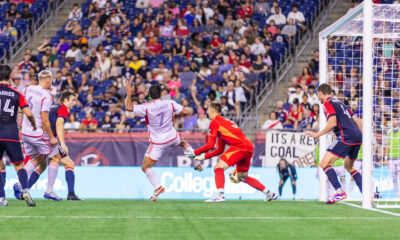
 Orlando City2 weeks ago
Orlando City2 weeks agoOrlando City vs. New England Revolution: Final Score 3-1 as Lions Finally Win at Gillette Stadium
-
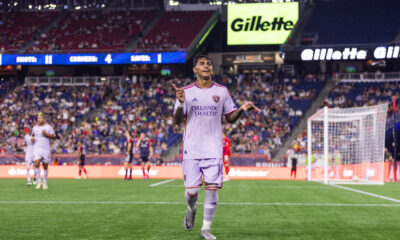
 Orlando City2 weeks ago
Orlando City2 weeks agoOrlando City vs. New England Revolution: Player Grades and Man of the Match
-
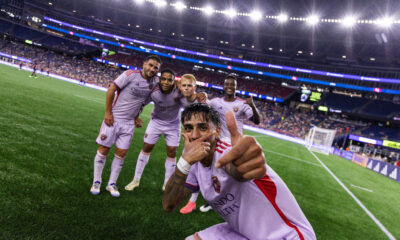
 Orlando City2 weeks ago
Orlando City2 weeks agoOrlando City vs. New England Revolution: Five Takeaways
-
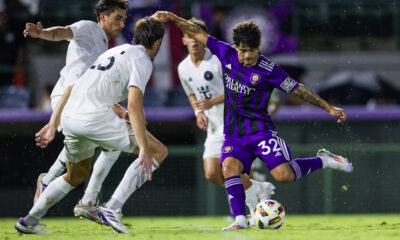
 Orlando City B2 weeks ago
Orlando City B2 weeks agoOrlando City B vs. Inter Miami II: Final Score 1-1 as OCB Draws Rivals and Claims a Second Point in Penalties
-
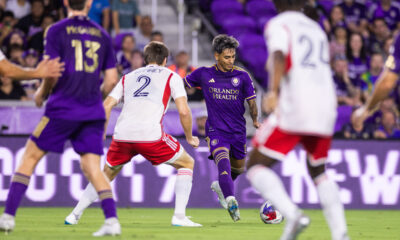
 Orlando City2 weeks ago
Orlando City2 weeks agoIntelligence Report: Orlando City vs. New England Revolution
-
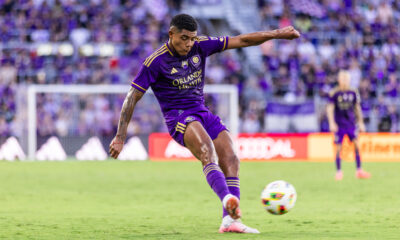
 Podcasts2 weeks ago
Podcasts2 weeks agoPawedCast Episode 432: New England Preview, OCB Set to Host Inter Miami II, and More
-
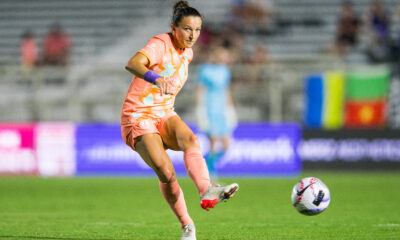
 Orlando Pride6 days ago
Orlando Pride6 days agoOrlando Pride vs. North Carolina Courage: Preview, How to Watch, TV Info, Live Stream, Lineups, Match Thread, and More
-
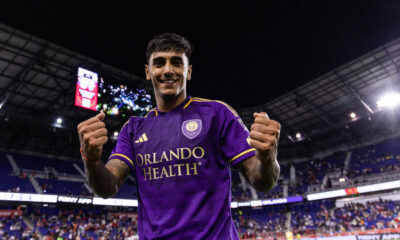
 Lion Links2 weeks ago
Lion Links2 weeks agoLion Links: 7/15/24


